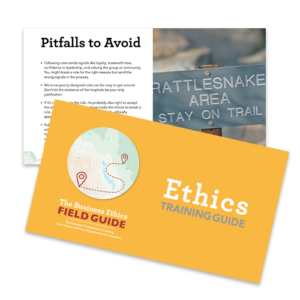
Make sure people have the skills to face those critical moments of decision that can mean the difference between Peril and Possibility
Ethics Is a Skill
The most common misconception for ethics is that it all comes down to character. We believe there are good apples and bad apples, and we try to fill our organizations with the good ones and get rid of the bad ones. But extensive research into the dilemmas that people face at work reveals that good people can make bad ethical choices, even after getting best-in-class compliance training. What’s missing for them is a set of skills that helps them navigate those moments where they struggle to know what to do and how to do it.
Training people to make better ethical choices isn’t the same as just training them on policies and procedures. Ethical behavior comes from the right blend of skills, culture, and character. Effective training enhances all three of these things, and without it, good people can make bad choices.
The Leading with Ethics training program focuses on developing ethics as a skill and ignites the workplace through customized workshops that engage professionals at all levels. Based on the research and strategies of The Business Ethics Field Guide, the Leading with Ethics program meets a wide range of mandatory ethics training requirements—plus it makes an outstanding onboarding tool for new employee training.
 We integrate ethical discussions into work utilizing fun and captivating exercises that are tailored to your workplace needs. Together, we focus on specific ethical dilemma exercises and discussions that challenge and educate employees. We also provide key insights and direction on developing a culture of ethics that influences every aspect of your organization.
We integrate ethical discussions into work utilizing fun and captivating exercises that are tailored to your workplace needs. Together, we focus on specific ethical dilemma exercises and discussions that challenge and educate employees. We also provide key insights and direction on developing a culture of ethics that influences every aspect of your organization.
- one-on-one consultation with leaders to customize each training and set an ethical tone that invokes consistent organizational values
- exercises to help employees recognize and manage ethical dilemmas, including the most common dilemmas identified by our research
- discussions on how to use the Ethics Toolkit to make better decisions
- strategies to implement Field Guide principles in the face of a dilemma
- comprehensive post-training assessment and analysis
- frequent email updates
The 13 Dilemmas
Here’s a quick rundown of the dilemmas and some of the questions you should be asking:
Standing Up to Power. Your boss or someone else in authority is asking you to do something unethical. Ask yourself: Can I get this done in some other way, without being unethical? How can I help my boss save face?
Made a Promise and World Has Changed. You made a promise, but unexpected events have made it very hard to keep. Ask yourself: Can I still keep my promise, even if costly to me? Does keeping this promise now make it harder to keep other promises?
Intervention. You see something that’s wrong but face risks if you try to stop it. Ask yourself: Are you the right person to intervene or should you recruit help? Can you intervene in a way that creates the least harm to everyone involved?
Conflict of Interests. Your personal interests and your work obligations are at cross purposes with each other. Ask yourself: Who has a right to know the details and have I let them know? Would my actions cause others to question my motives or character?
Suspicions Without Enough Evidence. You suspect something wrong is going on, but how you investigate could harm others. Ask yourself: What happens if I act on the allegations and they are false? Does my bias push me to believe or dismiss too quickly?
Playing Dirty. You have a chance to harm someone who has harmed you. Ask yourself: Would my action really bring about justice? Does my action solve a problem or is it merely revenge?
Skirting the Rules. To accomplish a worthy purpose, you have to go around the rules or break the law. Ask yourself: Would those with authority over the rules/law want you to break them in this case? What are all the reasons the rule or law matters?
Dissemblance. It helps you to misrepresent or allow someone to continue with a false understanding of your intentions or motives. Ask yourself: Do I have the authority to reveal the truth? What are the real reasons I want to misrepresent the truth?
Loyalty. Showing loyalty to someone comes at a cost to yourself or others. Ask yourself: Have they shown loyalty to me? Does demanding your loyalty allow them to take advantage of you?
Sacrificing Personal Values. Your work requires you to sacrifice values or relationships that you hold dear but that you can’t reasonably expect from others. Ask yourself: What costs am I willing to bear for my beliefs or relationships? What burden am I placing on others by imposing my beliefs or relationships?
Unfair Advantage. You have the upper hand, but not in a way that you’re sure is fair. Ask yourself: What makes the advantage unfair? If I were the other party, how would I consider a person making my choice?
Repair. You made a mistake, but can get away with not fixing it. Ask yourself: Who should bear the cost for the mistake? Did you act unethically when you made the mistake?
Showing Mercy. Someone has come asking for mercy, but granting it comes at a cost. Ask yourself: Is mercy mine to give? Does showing mercy in this case hurt someone else?
About the Training

Modules to Build Ethics Skills
Just as athletes train for competition, professionals need to train for the moments of decision in the face of an ethical dilemma. Ethics is the same; there are specific skills that help to navigate any dilemma safely and effectively. And as for the best performers in the world, the best training is research-driven using best practices.
In our Ethical Leadership training program, we train five essential skills for ethical leadership and decision-making. But even better, these skills enhance and strengthen every area of their work. We help them:
1. Master their values, so they are driven by clear and powerful principles
2. Be resourceful, to find help when as need it
3. Get creative, because the best problem-solving requires innovative thinking
4. Wield influence to help others around them make better choices
5. Build culture, an essential ability for any effective leader

Multiple Delivery Formats
The training program is available in-person or online, and can be delivered in the following ways:
• In person at your location
• Virtually
• Full-day
• Two half-day
• Six 90-minute modules

Customizable Add-Ons
You can also add customizations like:
• Your company branded edition of the Business Ethics Field Guide
• The Exercising Ethics ongoing learning with case studies
• Customized dilemmas with real-world examples from your business or industry
